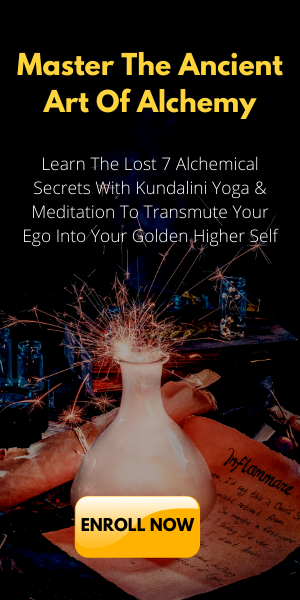Isaac Newton
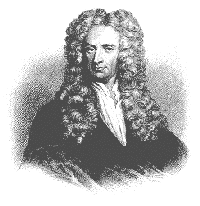 Sir Isaac Newton, the famous seventeenth-century mathematician and scientist, though not generally known as an alchemist, practiced the art with a passion. Though he wrote over a million words on the subject, after his death in 1727, the Royal Society deemed that they were “not fit to be printed.” The papers were rediscovered in the middle of the twentieth century and most scholars now concede that Newton was first an foremost an alchemist. It is also becoming obvious that the inspiration for Newton’s laws of light and theory of gravity came from his alchemical work.
Sir Isaac Newton, the famous seventeenth-century mathematician and scientist, though not generally known as an alchemist, practiced the art with a passion. Though he wrote over a million words on the subject, after his death in 1727, the Royal Society deemed that they were “not fit to be printed.” The papers were rediscovered in the middle of the twentieth century and most scholars now concede that Newton was first an foremost an alchemist. It is also becoming obvious that the inspiration for Newton’s laws of light and theory of gravity came from his alchemical work.
If one looks carefully, in the light of alchemical knowledge, at the definitive biography, Sir Isaac Newton by J. W. V. Sullivan, it is quite easy to realize the alchemical theories from which he was working. Sir Arthur Eddington, in reviewing this book, says: “The science in which Newton seems to have been chiefly interested, and on which he spent most of his time was alchemy. He read widely and made innumerable experiments, entirely without fruit so far as we know.” One of his servants records: “He very rarely went to bed until two or three of the clock, sometimes not till five or six, lying about four or five hours, especially at springtime or autumn, at which time he used to employ about six weeks in his laboratory, the fire scarce going out night or day. What his aim might be I was unable to penetrate into.” The answer is that Newton’s experiments were concerned with nothing more or less than alchemy. (from Alchemy Rediscovered and Restored by A. Cockren)
As a practicing alchemist, Newton spent days locked up in his laboratory, and not a few have suggested that he finally succeeded in transmuting lead into gold. Perhaps that explains one of the oddest things about his life. At the height of his career, instead of accepting a professorship at Cambridge, he was appointed Director of the Mint with the responsibility of securing and accounting for England’s repository of gold.
In fact, Newton — the revered founder of modern science and the mechanistic universe — also ranks as one of the greatest spiritual alchemists of all time. In his The Religion of Isaac Newton (Oxford 1974), F.E. Manuel concluded: “The more Newton’s theological and alchemical, chronological and mythological work is examined as a whole corpus, set by the side of his science, the more apparent it becomes that in his moments of grandeur he saw himself as the last of the interpreters of God’s will in actions, living on the fulfillment of times.”
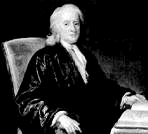
Isaac Newton considered himself primarily an alchemist.
This view has become more accepted in recent years, as more of Newton’s private papers and alchemical treatises are being reexamined. “Like all European alchemists from the Dark Ages to the beginning of the scientific era and beyond,” states Michael White in Isaac Newton:The Last Sorcerer (Addison Wesley 1997), “Newton was motivated by a deep-rooted commitment to the notion that alchemical wisdom extended back to ancient times. The Hermetic tradition — the body of alchemical knowledge — was believed to have originated in the mists of time and to have been given to humanity through supernatural agents.”
Newton’s Translation of the Emerald Tablet
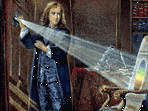
Newton was fascinated with light because he thought it embodied the Word of God, as suggested by the Emerald Tablet
It is true without lying, certain and most true. That which is Below is like that which is Above and that which is Above is like that which is Below to do the miracles of the Only Thing. And as all things have been and arose from One by the mediation of One, so all things have their birth from this One Thing by adaptation. The Sun is its father; the Moon its mother; the Wind hath carried it in its belly; the Earth is its nurse. The father of all perfection in the whole world is here. Its force or power is entire if it be converted into Earth. Separate the Earth from the Fire, the subtle from the gross, sweetly with great industry. It ascends from the Earth to the Heavens and again it descends to the Earth and receives the force of things superior and inferior. By this means you shall have the glory of the whole world and thereby all obscurity shall fly from you. Its force is above all force, for it vanquishes every subtle thing and penetrates every solid thing. So was the world created. From this are and do come admirable adaptations, whereof the process is here in this. Hence am I called Hermes Trismegistus, having the three parts of the philosophy of the whole world. That which I have said of the operation of the Sun is accomplished and ended.
Newton on Keeping Alchemy Secret
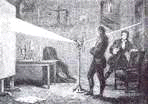
Newton’s roommate, John Wickins, assisted him in dozens of early experiments with light.
Isaac Newton wrote fellow alchemist Robert Boyle a letter urging him to keep “high silence” in publicly discussing the principles of alchemy. “Because the way by the Mercurial principle may be impregnated has been thought fit to be concealed by others that have know it,” Newton wrote, “and therefore may possibly be an inlet to something more noble that is not to be communicated without immense damage to the world if there be any verity in [the warning of the] Hermetic writers. There are other things besides the transmutation of metals which none but they understand.” According to B.J.T. Dobbs in The Foundations of Newton’s Alchemy (Cambridge University Press, 1984), “The fact that Newton never published a work on alchemy cannot be taken to mean that he knew he had failed [at the Great Work]. On the contrary, it probably means that he had enough success to think that he might be on the track of something of fundamental importance and so had good reason for keeping his ‘high silence,’ even though there is nothing to indicate that he himself was searching for that mysterious “inlet to something more noble.”

